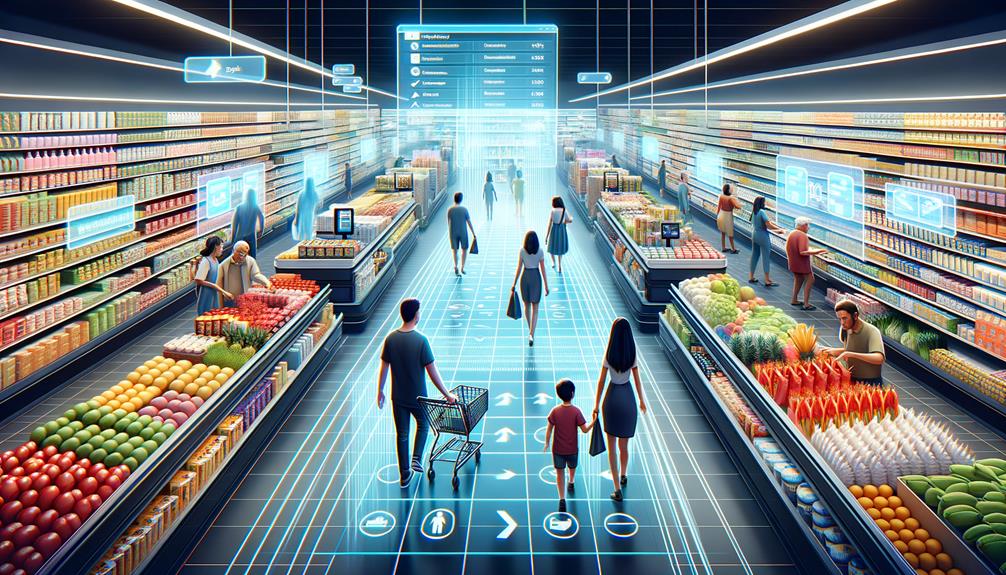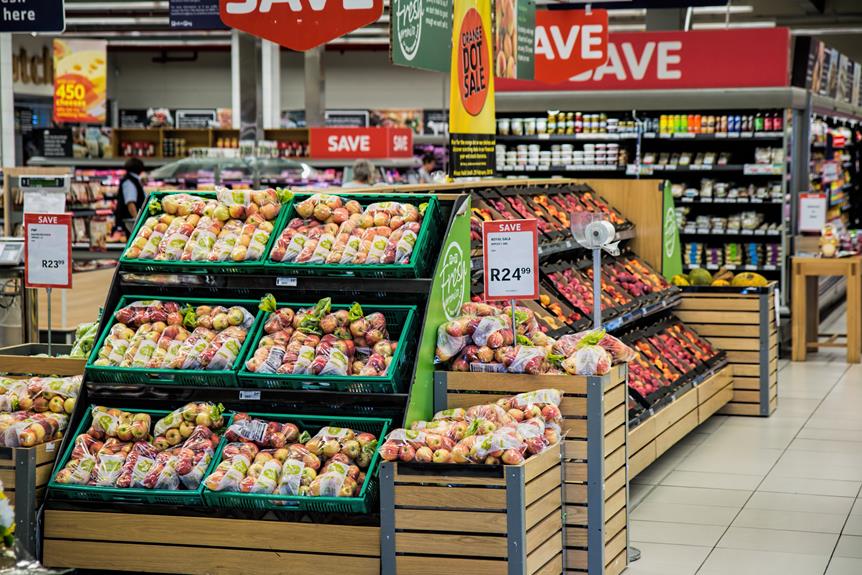As a team of experienced professionals in the grocery ecommerce industry, we've uncovered a critical aspect that many online store owners may not be aware of – the importance of fulfillment strategies.
While it's easy to focus on marketing and customer service, the way you handle order fulfillment can make or break your online grocery store.
In this discussion, we'll dive into the intricacies of fulfillment, exploring key strategies and best practices that can help you streamline operations and ensure a seamless shopping experience for your customers.
So, if you're ready to take your online grocery store to the next level, keep reading to discover the secrets behind successful fulfillment in this competitive landscape.
Fulfillment Strategies
When it comes to running a successful online grocery store, fulfillment strategies are the key to ensuring efficient and cost-effective delivery of products to customers.
Compliance regulations play a crucial role in delivering products to our customers. To determine specific needs for products and packaging, we can seek assistance from legal or regulatory experts.
It's important to note that shipping companies are experiencing delays, so we should focus on shortening supply chains and optimizing home deliveries.
Supporting organic and sustainable farms through local systems with fewer steps between grower and consumer can also improve our operations.
Fulfillment is the heartbeat of our grocery ecommerce operations, and we must prioritize cost-effectiveness and customer experience.
We can offer site-to-store pickup and direct delivery options, and partnering with local food delivery services can benefit our business.
Additionally, implementing micro-fulfillment centers, also known as dark stores, can improve our operations and expand our reach.
Technology and Infrastructure
To build a successful online grocery store, having the right technology and infrastructure in place is crucial for streamlining operations and providing a seamless customer experience. Passion and creativity are important, but having the right technical foundations is equally vital.
Software can simplify the complexities of the online grocery business, so choosing technology that operates as a central business hub is essential for speed and efficiency. Partner ecosystems and customizations are also important factors to consider when selecting software.
Technology enables adaptability to various situations in grocery ecommerce, supporting bulk orders, loyalty programs, and customizations. It plays a key role in managing inventory, orders, and customer relationships.
Therefore, choosing the right technology is crucial for the success of an online grocery store.
Customer Service and User Experience
Creating an exceptional customer service experience is essential for running a successful online grocery store. As an online retailer, we understand the importance of addressing questions and concerns from shoppers in a timely manner. That's why we maintain a channel specifically dedicated to fielding these inquiries.
Our use of technology allows us to assist with customer service efficiently, ensuring that every customer feels heard and valued. Additionally, we personalize customer interactions based on their dietary requirements, creating a more personalized and enjoyable shopping experience.
We also prioritize creating an easy-to-navigate website and focus on building a magnetic brand online. By providing assistance throughout the purchasing process, we aim to make the online experience similar and consistent with the in-store experience.
Integrations and Marketing
In order to effectively promote and grow an online grocery store, integrating various marketing strategies and tools is crucial for success. Here are some key tactics to consider:
- Utilize software that cooperates well with different types of technology, such as BigCommerce's suite of apps and integrations.
- Run pay-per-click advertising campaigns on platforms like Facebook, Twitter, and Instagram to reach your target audience.
- Develop a solid brand messaging and design strategy that resonates with your customers.
- Implement an omnichannel marketing approach that creates a memorable and consistent storyline.
Business Strategies and Growth
When it comes to growing an online grocery store, implementing effective business strategies is key to achieving success and standing out in a competitive market.
To counteract market forces and competition, prioritize quality over quantity and focus on food safety and compliance.
Partnering with other retailers can also provide wider exposure and attract more customers.
It's important to recognize the value of repeat customers – they spend more money, are easier to sell to, and are more efficient to acquire. Increasing customer loyalty by just 5% can result in a 75% increase in profitability.
Consider launching a monthly program around your products, offering customers the ability to start and stop the subscription at any time. By consistently providing value and introducing new items or pairings, you can keep customers engaged and coming back for more.
Compliance Regulations
To ensure the smooth operation of an online grocery store, it's essential to adhere to compliance regulations that govern the delivery of products to customers. These regulations not only protect the customers but also ensure that the store operates legally and ethically.
Here are four key compliance regulations that every online grocery store should be aware of:
- Food Safety Standards: It's important to follow strict food safety standards to ensure that the products being delivered to customers are safe for consumption. This includes proper handling, storage, and transportation of perishable items.
- Packaging and Labeling Requirements: Online grocery stores must comply with packaging and labeling regulations to provide accurate information to customers about the products they're purchasing. This includes listing ingredients, nutritional information, and allergen warnings.
- Privacy and Data Protection: Online stores must comply with privacy and data protection regulations to safeguard customer information. This includes obtaining consent for collecting and storing personal data, as well as implementing measures to prevent unauthorized access or breaches.
- Delivery and Transportation Regulations: Compliance with delivery and transportation regulations is crucial to ensure the safe and timely delivery of products to customers. This includes following proper procedures for handling and transporting goods, as well as adhering to traffic and safety regulations.
Shipping and Logistics
Shipping and logistics play a crucial role in the success of an online grocery store, ensuring that products are delivered efficiently and on time to customers' doorsteps. It is important to have a well-organized and streamlined shipping process to provide a seamless experience for customers. To emphasize the importance of shipping and logistics, let's take a look at the following table:
| Key Considerations for Shipping and Logistics |
|---|
| Compliance with regulations and packaging needs |
| Shortening supply chains and optimizing home deliveries |
| Supporting local systems for organic and sustainable farms |
| Cost-effectiveness and customer experience |
Partner Ecosystem and Customizations
In building a successful online grocery store, there are two key factors that are crucial for delivering a seamless and tailored shopping experience to customers: establishing a strong partner ecosystem and implementing customizations. Here are four key reasons why these factors are essential:
- Enhanced Product Variety: Partnering with a diverse range of suppliers enables us to offer a wide selection of products, catering to different customer preferences and dietary needs.
- Streamlined Operations: Customizing our software and technology infrastructure allows us to optimize processes, automate tasks, and improve efficiency. This ultimately saves time and costs, making our operations more streamlined.
- Personalized Customer Experience: Through customizations, we can tailor our website, promotions, and communication to each individual customer. This creates a more engaging and personalized shopping experience, enhancing customer satisfaction and loyalty.
- Continuous Innovation: Collaborating with partners and leveraging customizations enables us to stay ahead of the curve. We can adapt to changing market trends and continuously improve our offerings, ensuring that we always provide innovative and relevant solutions to our customers.
Frequently Asked Questions
How Can Compliance Regulations Impact the Delivery of Products in a Grocery Ecommerce Business?
Compliance regulations play a crucial role in the delivery of products in a grocery ecommerce business. They ensure that products are safely packaged and meet the necessary legal requirements. By working with legal or regulatory experts, businesses can determine the specific needs for their products.
Additionally, shipping companies are experiencing delays, so shortening supply chains and optimizing home deliveries can help ensure compliance and timely delivery.
Prioritizing compliance regulations is essential for running a successful online store and providing a seamless customer experience.
What Role Does Technology Play in Managing Inventory and Customer Relationships in an Online Grocery Store?
Technology plays a crucial role in managing inventory and customer relationships in our online grocery store. With the right software and infrastructure in place, we can streamline operations and improve efficiency. Our technology enables us to track inventory levels, manage orders, and provide personalized customer interactions based on their preferences.
It also helps us maintain a seamless shopping experience and build strong customer relationships. By leveraging technology, we can effectively manage our inventory and ensure customer satisfaction in our online grocery store.
What Are Some Key Factors to Consider When Selecting Software for a Grocery Ecommerce Business?
When selecting software for a grocery ecommerce business, there are several key factors to consider.
First, it's important to choose technology that operates as a central business hub, ensuring speed and efficiency.
Customizations and partner ecosystems should also be taken into account.
Additionally, the software should support bulk orders, loyalty programs, and have the capability to manage inventory, orders, and customer relationships.
Making the right software choice is crucial for the success of an online grocery store.
How Can a Grocery Ecommerce Business Personalize Customer Interactions Based on Dietary Requirements?
To personalize customer interactions based on dietary requirements, we can gather information from customers during the registration process or through surveys. By understanding their preferences and restrictions, we can offer tailored product recommendations and create personalized shopping experiences.
Integrating technology like AI and machine learning can also help analyze customer data and provide relevant suggestions. Additionally, offering filters and search options based on dietary needs can make it easier for customers to find suitable products.
Ultimately, our goal is to provide a seamless and personalized experience for each customer.
How Can Partnerships With Other Retailers Benefit a Grocery Ecommerce Business in Terms of Exposure and Growth?
Partnerships with other retailers can greatly benefit our grocery ecommerce business in terms of exposure and growth. By collaborating with established retailers, we can tap into their existing customer base and gain wider visibility. This allows us to reach a larger audience and increase our brand awareness.
Additionally, partnering with retailers can help us expand our product offerings and provide a more diverse range of options to our customers.
Conclusion
In conclusion, running a successful online grocery store requires a strategic focus on several key elements. These include fulfillment, technology, customer service, integrations, and business growth.
By prioritizing these elements, you can create a delightful shopping experience for your customers and foster loyalty. This involves staying compliant with regulations and ensuring that your fulfillment processes are efficient and reliable.
Additionally, technology plays a crucial role in running an online grocery store. This includes having a user-friendly website or app, as well as utilizing data analytics to understand customer preferences and improve your offerings.
Customer service is another important aspect to consider. Providing timely and helpful support to your customers can make a big difference in their overall experience and satisfaction.
Integrations with other platforms and systems can also streamline your operations and enhance the overall efficiency of your online grocery store. This can include syncing inventory, integrating payment gateways, and connecting with delivery partners.
Finally, focusing on business growth is essential for long-term success. This involves optimizing your shipping and logistics processes, leveraging partnerships and customizations, and continuously seeking opportunities to expand your reach and drive sales.
With these strategies in place, you can thrive in the competitive landscape of online grocery sales.



